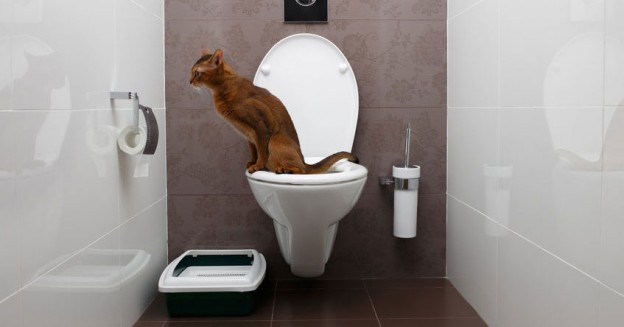We've uncovered this great article pertaining to Don’t flush cat feces down the toilet listed below on the web and figured it made good sense to discuss it with you on my blog.

Intro
As feline proprietors, it's important to be mindful of how we dispose of our feline friends' waste. While it might appear practical to flush cat poop down the toilet, this practice can have harmful repercussions for both the setting and human health.
Alternatives to Flushing
Fortunately, there are safer and more liable ways to deal with cat poop. Take into consideration the complying with alternatives:
1. Scoop and Dispose in Trash
One of the most typical method of taking care of feline poop is to scoop it into an eco-friendly bag and throw it in the trash. Make sure to make use of a dedicated litter inside story and get rid of the waste immediately.
2. Usage Biodegradable Litter
Choose naturally degradable pet cat litter made from products such as corn or wheat. These clutters are environmentally friendly and can be securely taken care of in the trash.
3. Bury in the Yard
If you have a backyard, consider hiding pet cat waste in an assigned area away from veggie yards and water resources. Be sure to dig deep adequate to stop contamination of groundwater.
4. Mount a Pet Waste Disposal System
Invest in a pet dog waste disposal system particularly created for pet cat waste. These systems use enzymes to break down the waste, minimizing smell and ecological effect.
Wellness Risks
In addition to environmental concerns, purging cat waste can likewise present wellness dangers to people. Pet cat feces may include Toxoplasma gondii, a parasite that can create toxoplasmosis-- a possibly serious disease, especially for pregnant females and people with weakened immune systems.
Ecological Impact
Flushing cat poop introduces damaging virus and bloodsuckers into the supply of water, posing a considerable risk to water ecological communities. These impurities can adversely affect marine life and concession water top quality.
Conclusion
Liable pet possession expands beyond supplying food and shelter-- it additionally includes appropriate waste administration. By avoiding purging feline poop down the commode and selecting alternative disposal techniques, we can decrease our environmental impact and protect human health.
Why Can’t I Flush Cat Poop?
It Spreads a Parasite
Cats are frequently infected with a parasite called toxoplasma gondii. The parasite causes an infection called toxoplasmosis. It is usually harmless to cats. The parasite only uses cat poop as a host for its eggs. Otherwise, the cat’s immune system usually keeps the infection at low enough levels to maintain its own health. But it does not stop the develop of eggs. These eggs are tiny and surprisingly tough. They may survive for a year before they begin to grow. But that’s the problem.
Our wastewater system is not designed to deal with toxoplasmosis eggs. Instead, most eggs will flush from your toilet into sewers and wastewater management plants. After the sewage is treated for many other harmful things in it, it is typically released into local rivers, lakes, or oceans. Here, the toxoplasmosis eggs can find new hosts, including starfish, crabs, otters, and many other wildlife. For many, this is a significant risk to their health. Toxoplasmosis can also end up infecting water sources that are important for agriculture, which means our deer, pigs, and sheep can get infected too.
Is There Risk to Humans?
There can be a risk to human life from flushing cat poop down the toilet. If you do so, the parasites from your cat’s poop can end up in shellfish, game animals, or livestock. If this meat is then served raw or undercooked, the people who eat it can get sick.
In fact, according to the CDC, 40 million people in the United States are infected with toxoplasma gondii. They get it from exposure to infected seafood, or from some kind of cat poop contamination, like drinking from a stream that is contaminated or touching anything that has come into contact with cat poop. That includes just cleaning a cat litter box.
Most people who get infected with these parasites will not develop any symptoms. However, for pregnant women or for those with compromised immune systems, the parasite can cause severe health problems.
How to Handle Cat Poop
The best way to handle cat poop is actually to clean the box more often. The eggs that the parasite sheds will not become active until one to five days after the cat poops. That means that if you clean daily, you’re much less likely to come into direct contact with infectious eggs.
That said, always dispose of cat poop in the garbage and not down the toilet. Wash your hands before and after you clean the litter box, and bring the bag of poop right outside to your garbage bins.
https://trenchlesssolutionsusa.com/why-cant-i-flush-cat-poop/

We had been made aware of that editorial about Can You Flush Cat Poop Down The Toilet? from an acquaintance on another site. Sharing is nice. You never know, you might be doing someone a favor. Thanks for your time. Kindly come visit our site back soon.
Call Today